Cayman News
Cayman News's Latest Posts

DMS USA seeks to block $177m RICO ‘shakedown’
(CNS Business): DMS Management (USA) has taken legal action to halt what it calls “an 8 month barrage of extortionate threats” and to prevent the defendant, Steven J. Goodman, from filing a civil suit claiming $177 million in damages as the victim of racketeering. The civil action, filed in the Southern District of New York by Reed Smith LLP on behalf of DMS USA, refers to the threatened civil suit by Goodman, which asserts Racketeer Influenced and Corrupt Organizations Act (RICO) claims against DMS USA, as “a shakedown”. It also accuses him of targeting DMS USA, a marketing company which had no connection to the complaint, so that he could use the threat of RICO rather than sue its Cayman Islands-based affiliate company, DMS Offshore Investment Services, using the courts in Cayman, where if he lost he would be left facing a large tab in court costs. Read more on CNS Business
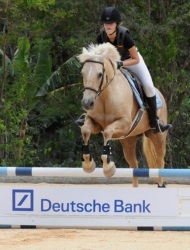
Cayman riders first in show jumping competition
 (CIEF): Once a year the Cayman Islands Equestrian Federation plays host to the best youth show jumpers in the Caribbean for the second round of the Caribbean Equestrian Federation’s Junior Show Jumping Competition. In the first round of the competition hosted by Barbados in January 2014, the Cayman Team were represented by Isabelle Smith and Madeleine Aquart, both new starters in the team. They performed well and finished third. The team for the Cayman competition was picked by trial earlier in the season and the riders winning the right to represent Cayman were Isabelle Smith in the under 16 category and Hannah Fowler in the under 14 category. For Fowler it would be the first time riding for the team.
(CIEF): Once a year the Cayman Islands Equestrian Federation plays host to the best youth show jumpers in the Caribbean for the second round of the Caribbean Equestrian Federation’s Junior Show Jumping Competition. In the first round of the competition hosted by Barbados in January 2014, the Cayman Team were represented by Isabelle Smith and Madeleine Aquart, both new starters in the team. They performed well and finished third. The team for the Cayman competition was picked by trial earlier in the season and the riders winning the right to represent Cayman were Isabelle Smith in the under 16 category and Hannah Fowler in the under 14 category. For Fowler it would be the first time riding for the team.
With the competition set for 10 and 11 May, the Cayman Team welcomed competitors from Barbados, Jamaica and Trinidad and Tobago.
The first day of competition saw all riders in the under 16 category go clear with Cayman’s Smith posting the fastest time of the four. Fowler got off to a shaky start posting 8 faults leaving Hannah Deleon of Jamaica out front, the only rider to go clear in the first round. However in round 2, Deleon was the only under 14 rider to post faults, collecting 8 in the field, with her competitors all posting clear rounds. The under 16s remained pretty tight with only Amber Thompson of Jamaica collecting four faults in her round.
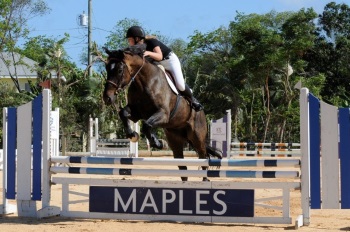 At the end of the first day, the teams were pretty well bunched together with Barbados out front with four faults and Jamaica and Cayman in joint second on eight faults with Trinidad bringing up the rear on 13 faults. However, as all show jumpers are fond of saying, ‘anything can happen’ and the third round on Sunday morning was to prove this true by shaking up the pack and turning things upside down.
At the end of the first day, the teams were pretty well bunched together with Barbados out front with four faults and Jamaica and Cayman in joint second on eight faults with Trinidad bringing up the rear on 13 faults. However, as all show jumpers are fond of saying, ‘anything can happen’ and the third round on Sunday morning was to prove this true by shaking up the pack and turning things upside down.
It was the turn of the under 14s to go first on Sunday morning and only Fowler, now settled in her stride, would go clear. The rest of the teams collected a host of field and time faults. Jamaica picked up 11, Trinidad 15 and Barbados a costly 17. This thrust Cayman into the lead going into the final round.
All four riders in the under 16 category posted clear rounds putting the pressure on their teammates in the under 14s to follow their lead.
All four went clear with Barbados and Cayman collecting time faults but Cayman’s lead by this time was so well established that they clinched the title nevertheless. A delighted Fowler and Smith took the First Place Award for the Cayman Team with a total of 13 faults, with Jamaica in second place on 19 faults, Barbados in third on 23 faults and Trinidad and Tobago in fourth on 28 faults.
In the individual competitions, Fowler placed first in the under 14s and Smith placed second in the under 16s, which was a tough category with 3 of the 4 riders finishing on 4 faults and Smith missing out on the top spot by less than 3 seconds. Cayman’s success bodes well for the rest of the competition.
Jenna Boucher, who had kindly loaned her horse, Katrina, to the competition, was awarded a ‘Clear Round Horse’ Award as Katrina was only the only horse in the competition to go clear all four rounds.
Overall, these result put Cayman in joint first place with Barbados so far for the year. The next round of the competition is in September in Trinidad, with the fourth leg in Jamaica in November rounding out the series.
The CIEF was delighted to partner with a number of sponsors for 2014, both new and old: Gold Sponsors, Maples and Calder and Deutsche Bank were joined by Silver Sponsors Butterfield Bank, Cayman National Bank, Genesis Trust and Corporate Services Ltd., Stepping Stones and a host of Bronze Sponsors.
“We were so pleased that so many corporate sponsors came on board this year to sponsor this event. We were not only able to fund the costs of the competition with their donations but we were also able to build a fabulous jump course with nearly every jump sponsored by a company and sporting their company logo,” said Sharon Hinds, President of CIEF. “We are also very grateful for the support of the CI Olympic Committee this season and wanted to honour that support with an ‘Olympic’ jump built for them. These events are products of so many people and parts and we are grateful to all our sponsors, parents, volunteers, host families and coaches who made this event such a successful one.”

Public mutuals ‘best solution’
(CNS): A local business owner is suggesting that government re-think its strategy to sell off government assets and look at mutualization as an alternative – a solution that he said is “taking off like wildfire in the UK”. Steve McIntosh, owner of local recruiting agency CMLOR, explained that the initiative, also known as public mutuals, involves setting up a government entity or department as a private company, where the existing staff become shareholders, and to contract that company to deliver its service. McIntosh is suggesting that in Cayman, 40% of the government entity would be owned by the staff and the other 60% would be auctioned off in 10% blocks to individuals, maintaining that there are many local investors who are willing to help the country but would apply real market forces and expect accountability.
Under the mutualization scheme, if a government department is currently costing $1 million to run, as a company it would be paid roughly the same amount as part of its contract but it would be up to the staff, as shareholders, and the investors to make the department run more efficiently, effectively privatizing government without laying anyone off.
The company would be regulated by its contract with government and equity would be distributed so that 20%, at no cost, was given to the management team, according to seniority and length of service; 20%, at no cost, to the remaining staff; 60% to private investors, who would be invited to bid for tranches of up to 10%.
McIntosh suggests that the initial contract would be for a period of five years (non-performance notwithstanding) after which the contract would be renegotiated. The fee paid to the company would be 95% of the prior year budget and would reduce by 5% each subsequent year of the contract till renewal at year five. The new company would be required to rehire all of the existing staff and retain them for at least five years (dismissal for cause notwithstanding) on no less than 95% of their current salary.
He said that some departments and entities with distinct roles, such as DER, DCI, Radio Cayman, the Cayman Turtle Farm, Computer Services, Hazard Management and Lands & Survey, could be turned into public mutuals very easily, while other services, functions and teams within larger government ministries, such as the Education Ministry's scholarship secretariat, could potentially be gradually spun off in a similar way.
McIntosh said there are a couple of departments that he would invest in as a philanthropist, such as the National Workforce Development Agency (NWDA) because he believes, as a professional recruiter, that he can usefully contribute to the running of the department. His investment would get him a seat on the board, and while he would not have control of the company, he would have a say in the way it was run. “In this way, you would harness a great deal of management capability and innovation for free.
“Right now, if a government department is totally dysfunctional, basically the recourse is for the ministry to come in and to micromanage the hell out of it,” he said and pointed out that the failing department would have compounding problems, such staff issues, infrastructure problems, budget problems, and micromanaging rarely improves things.
“Government generally tries to solve problems by taking more control and what’s needed is for it to have less control,” he explained. Some services, such as education, cannot be just about profit, but, McIntosh said, “I also believe that with a total absence of market forces you’re going to have sub-optimal outcomes. Most governments are trying to bring in the effects of market forces without the downside, like monopolies.”
One of the hardest things to do when it comes to management is to fire people who are not performing, McIntosh said, acknowledging that if it wasn’t his own money he was dealing with, he would be tempted to find excuses not to do it. This is one area where market forces needs to be implemented in government services. Each public mutual company would have independent boards with the power to hire and fire, he explained, which would be one of the main areas that distinguished them from the concept of statutory authorities and government companies, where government retains control through the appointment of the boards.
The key to the scheme is the contract and government would have to get good at writing them, he said. If a company that is a former government department failed to deliver, it is far easier to cancel the contract, he noted, and it could also be written in the contract that government retained the ability to de-mutualize the department and take it back into core government if the public mutual is not working. “At the very least they would get a year of people clearing it up,” he said.
“Everyone agrees that government is somewhat inefficient in what it does but the solution to that is not to make arbitrary cuts,” McIntosh told CNS Business. “People like idea of smaller government in the abstract but when it impacts services, they’re likely to feel differently about it. It’s the paradox of government. The solution is to find a more effective ways to deliver services and I think the leaders of the civil service understand that.”
McIntosh said that he came up with this idea a few years ago as a solution for the Cayman Islands, calling it ‘management buy out’, and put it to government officials at the time, but they wanted to know if it had worked anywhere else. “At the time it was just a hair brained idea that some recruiter had come up with. But as I was following the SAGE Commission in Bermuda, they referred to ‘public service mutuals’ and I realised that it was exactly what I had proposed two or three years ago. And when I researched it, I found out that there is a department within the UK government that is set up to create these companies.”
McIntosh said there is a “tonne of willingness to tap into” within the private sector. Many within the business community are ready to assist in sorting out problems within government, he said, and the reason that no one has yet stepped up to help in the rationalization process is that they have not yet been asked. “There’s nothing to step up to yet,” he pointed out.
If the rationisation process goes ahead and civil servants are laid offt, he said there are jobs in the private sector to absorb them. “The employment market is not as difficult to understand as a lot of people think it is,” McIntosh said. “In a country where there are twice as many jobs as members of the workforce, which as far as I know is a unique situation, the one and only reason anyone is out of work is that of salary expectation.” Stressing that this expectation is not always unreasonable, he said that if civil servants were made redundant and the salary expectation is in line with the market, there is no reason why they will not get hired.
However, he does not think the government’s plans to sell off various public entities is going to result in a loss of many jobs because it’s just not going to work, being, for one thing, politically very difficult.
“Mutualization is by far the best solution – it's a no brainer. It doesn’t involve a single layoff and converts departments from public to private entities and the employees of the department become owners in their own department,” McIntosh added, noting that the system would fit well with the existing Public Service Management Law and budget documents, which set out the deliverables. “We’re already halfway there,” he said.

Tennis lessons resume at East End Primary
 (TFCI): Pupils at East End Primary were delighted to welcome back tennis pro Noel Watkins last week, as weekly tennis lessons once more resumed at the school thanks to Cayman National’s ongoing sponsorship. Ethana Villalobos, a prefect at the school, has been part of the Cayman National-sponsored tennis programme at East End for the past three years. Ethana, who celebrates/celebrated her 11th birthday on Thursday 29 May, reported, “Tennis is one of the best things of the week. Tennis and football are my favourite things at school.” “East End’s young players are carefully selected to join the Cayman National programme by three criteria: good behaviour, talent and enthusiasm,” reports coach Watkins.
(TFCI): Pupils at East End Primary were delighted to welcome back tennis pro Noel Watkins last week, as weekly tennis lessons once more resumed at the school thanks to Cayman National’s ongoing sponsorship. Ethana Villalobos, a prefect at the school, has been part of the Cayman National-sponsored tennis programme at East End for the past three years. Ethana, who celebrates/celebrated her 11th birthday on Thursday 29 May, reported, “Tennis is one of the best things of the week. Tennis and football are my favourite things at school.” “East End’s young players are carefully selected to join the Cayman National programme by three criteria: good behaviour, talent and enthusiasm,” reports coach Watkins.
Players are drawn from all age groups. Each weekly lesson lasts one hour, with the youngsters using short-handled racquets, slow balls and mini nets specially designed for juniors.
“East End is a super bunch of kids, I really enjoy working with them and their tennis has come on well,” reported Watkins. “They can now serve and rally, and are having great fun with tennis while learning the necessary skills.” Watkins is being helped this term by an assistant coach, Aine Leonard of Ireland.
East End is not the only school that benefits from Cayman National’s generous sponsorship: Bodden Town, North Side and West Bay schools are also treated to tennis lessons, which are organized via the Tennis Federation of the Cayman Islands in conjunction with Watkins at Cayman Tennis Academy.
“The youth of the Cayman Islands is one of the focuses of Cayman National and we recognise that participation in sports provides opportunities for leadership, socialization as well as development of skills in our youth. In addition they are offered an opportunity to learn new skills, while having fun interacting with their peers. Cayman National is pleased to see the programme off to a great start this year,” said Shari Whittaker, Cayman National Bank Marketing Manager. (Below: East End students with Noel Watkins and Aine Leonard)
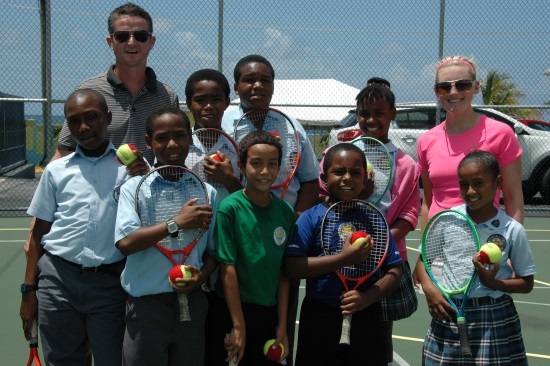

‘Ice on Ice’ cocktail gala to benefit Cancer Society
(CNS): Cayman's party crowd are getting ready for the coolest event of the summer. This year's 'Ice on Ice' Cocktail Party will be at held at the National Gallery in aid of the Cayman Islands Cancer Society on Thursday 29 May. The organisers, Z99, promise an evening with some great music from DJ Jonesian, incredible prizes -including diamonds for four lucky winners – as well as some exciting fundraising incentives for the community to help support the Cancer Society's Chemotherapy Unit. Tickets cost just $39 at the door and each includes a complimentary signature 'Iceburg Cocktail', adorned with a cubic zirconia jewel, but the twist is that four will actually be prizes of half carat diamonds from Kirk Freeport.
Anyone that raises $500 by 29 May to donate to the Cancer Society will get two complimentary tickets to 'Ice on Ice' and the person or company that raises the most money for the charity will be honoured at the gala event and will also win one of a huge range of prizes, like a trip to Strawberry Hills in Jamaica, a Red Sail sunset cruise for ten, or a day of pampering at your office courtesy of Posh Spa.
"This is our eighth annual 'Ice on Ice' Cocktail Party to benefit the Cayman Islands Cancer Society and we wanted to make it fun forthe whole community to get involved," said Jennifer Steele from Hurley's Entertainment. "The event is extremely important to us and I'm sure everyone in Cayman knows somebody that has been affected to some extent. Of course, none of this would be possible without our sponsors: Butterfield, Britcay, Iceberg Vodka, Kirk Freeport, Holy Cross Hospital, The Security Centre, Personnel 2000 and Greenlight Re, so I'd like to thank them all very much."
All the money collected will go towards the Cayman Islands Cancer Society's New Chemotherapy Unit at the George Town Hospital, which will more than double the current capacity for healing treatment in Cayman, allowing more people in need to be closer to their family and friends.
Jennifer Weber, Operations Director at the Cayman Islands Cancer Society said: “We are so excited to have Ice and Ice… with a twist! It’s going to be a great event where guests can win diamonds and who doesn’t like diamonds?! More importantly the funds raised at this event are going to help us help others in our community. The money raised in Cayman stays in Cayman so I hope corporations and groups of friends will take on the challenge and support Ice on Ice in some way.”
The fun starts at 6pm on Thursday 29 May until 9pm and as well as being available at the National Gallery on the night, tickets can also be purchased in advance from the Cancer Society or online at http://www.active.com/donate/iceonicecayman .
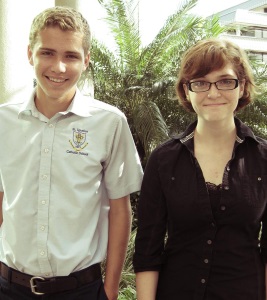
Caymanian students selected for UWC
 (CNS): Having been selected by the local national committee as its 2014 scholars, Sean Whewell and Giovanna Stafford are the latest Caymanians to join the United World Colleges (UWC) movement and will receive academic scholarships for the two-year pre-university programme. Beginning in August, Sean will attend UWC-USA in Montezuma, New Mexico and Giovanna will head to UWC Adriatic in Duino, Italy. After completing their ‘O’ Level qualifications this summer, they will study for the highly respected International Baccalaureate Diploma at UWC alongside students from around the world.
(CNS): Having been selected by the local national committee as its 2014 scholars, Sean Whewell and Giovanna Stafford are the latest Caymanians to join the United World Colleges (UWC) movement and will receive academic scholarships for the two-year pre-university programme. Beginning in August, Sean will attend UWC-USA in Montezuma, New Mexico and Giovanna will head to UWC Adriatic in Duino, Italy. After completing their ‘O’ Level qualifications this summer, they will study for the highly respected International Baccalaureate Diploma at UWC alongside students from around the world.
In addition to their exceptional scholastic records, this year’s scholars are actively involved in various community service and co-curricular activities.
Among their accomplishments, Giovanna has volunteered at the Humane Society and National Gallery and is a talented musician, while Sean has participated in Junior Achievement and Key Club and is an avid footballer.
Commenting on this year’s selection process, UWC Cayman Islands Chairperson Aubrey Bodden (UWC-USA ’04) stated: “As with most years, we had a very strong set of applicants and the selection committee was very impressed with all of the shortlisted candidates. Sean and Giovanna will do an excellent job representing the Cayman Islands at UWC and I wish them all the best as they embark on this new, challenging and life-changing experience!”
Looking beyond 2014, Bodden also noted, “As awareness of the UWC movement continues to grow locally and additional colleges open in Germany, Armenia and China over the next two years, a larger number of places will be available globally and we expect that there will also be additional qualified Caymanian students to fill them. We therefore look forward to selecting more candidates for this unique educational opportunity in the years to come.
“However, it is only through the continued support and commitment of our volunteers and sponsors that we are able to continue the completely need-blind, merit-based selection process that is at the core of our values. Inability to pay should never deprive a deserving candidate of the opportunity to attend UWC.”
This year UWC Cayman Islands proudly celebrates 30 years as part of the unique globaleducational movement that was founded in 1962 in the pursuit of peace and justice. UWC seeks to bring together young people from different races, religions and cultures to learn from one another. At each college academic achievements are put into perspective with a demanding mix of community engagement, international affairs, physical activities, service commitments and creative pursuits.
Over the past three decades, approximately 70 Caymanians have attended UWC, spending two years living and learning with students from all over the world at colleges in Canada, India, Swaziland, Hong Kong, Wales, the USA, Italy and Costa Rica. UWC colleges are also currently located in Singapore, the Netherlands, Bosnia & Herzegovina and Norway.
Thanks to a large and dedicated network of volunteers, generous corporate and individual donors, and community support for fundraising activities, most Caymanians have also received scholarships to cover tuition and accommodation expenses and travel as necessary.
In recognising those who make the charitable organisation’s work possible, Bodden added, "I would like to, in particular, thank this year’s major donors for their support – Maples and Calder, Deutsche Bank, the Aall Foundation, alumnus Linburgh Martin (Atlantic College ’86), Greenlight Re, the Cayman Islands Compliance Association and Cayman National – and our volunteer-run Board of Directors and selection committee for their dedication.
“I also invite other companies and individuals to contact us at uwccaymanislands@gmail.com if you are interested in learning more about UWC and how to become a part of this exciting and life-changing movement by applying, donating or volunteering your time and skills. Every contribution – no matter how small you may think it is – helps further the UWC mission to make education a force to unite people, nations and cultures for peace and a sustainable future.”

Numeracy focus in schools
 (CNS): Improving the standard of mathematics throughout government schools is a long slow process and entails a complete shift in the way that the subject is taught so that students connect maths to real life situations, according to the Education Ministry’s numeracy specialist, Frank Eade. The first step in tackling a recognized problem across the whole system is to re-train the teachers to teach maths in a less prescriptive way and to focus on visualization methods so that children get a real concept of numbers instead of seeing them as just marks on a page. This ongoing effort has already resulted in dramatic improvements in the primary students’ attainment levels since 2011, with a clear drop in the percentage of students in the lower attainment levels and a corresponding rise in students reaching the upper levels.
(CNS): Improving the standard of mathematics throughout government schools is a long slow process and entails a complete shift in the way that the subject is taught so that students connect maths to real life situations, according to the Education Ministry’s numeracy specialist, Frank Eade. The first step in tackling a recognized problem across the whole system is to re-train the teachers to teach maths in a less prescriptive way and to focus on visualization methods so that children get a real concept of numbers instead of seeing them as just marks on a page. This ongoing effort has already resulted in dramatic improvements in the primary students’ attainment levels since 2011, with a clear drop in the percentage of students in the lower attainment levels and a corresponding rise in students reaching the upper levels.
Student results in the public domain are widely misunderstood, Eade told CNS. The Cayman Islands has adopted the UK assessment process of attainment levels – though not, he stressed, the method of teaching. There are 8 levels and the target is for at least 50% of students to reach Level 4 by the end of Year 6. While everyone would like all children to be reaching Level 4 or above by that stage, that is not a reasonable expected result in any country, he explained.
Eade said that when he arrived two and half years ago in 2011 the percentage of students at Key Stage 2 (end of Year 6) who were at Level 2 or below in maths was 23%. In 2013, this had dropped to 13%. Correspondingly, the percentage of students at Level 4 or above has increased from 25% in 2011 to 40% just two years later in 2013.
In the UK around 80% of the children are – on paper – reaching Level 4 in maths by the end of primary school, but Eade said that the immense pressure on schools and teachers in Britain to improve statistics had warped the results, which have been achieved through a ‘production line’ mentality.
“In the UK Year 6 has become a revision factory,” he said. “The results are a bit of an illusion and no longer a true reflection of the students’ attainment levels.” Many secondary schools in the UK no longer use the assessment levels to gauge new Year 7 students’ abilities and give them CAT tests instead, he explained. “When you look at the international tables, which focus on problem solving, England has not improved at all in the last 10 or 15 years. So we have to be careful about how we look at the data.”
Countries that do very well on international tables, such as Singapore and Japan, teach maths in a very similar way to the methods now being introduced in Cayman schools.
The Cayman Islands Ministry of Education’s goal, he said, is to avoid the false results of the UK and to achieve real improvements in maths that will enable students to continue to implement what they have learned beyond school, in their lives and in their jobs, and for somethough higher learning. Not gaining a firm grasp of maths at primary level can later become an impediment for even the more academic students who go on to study such subjects as engineering, science, finance and economics, as well as mathematics itself, at university.
“Mathematics is rather peculiar subject. What you want students to do is tobe able to solve problems that are mathematical but also about the world around them, but it is often taught in a very prescriptive way and the children end up not being comfortable with it and not being good problem solvers,” Eade explained. “Not being able to use mathematics to solve problems in everyday situations is because of the way mathematics is taught. Generally, in most countries, it is a set of rules handed down by the teacher and the children are taught to go through the motions without really thinking about it all.”
To illustrate, he gave a typical fraction problem: three sandwiches to divide between four children. Students who have not been taught effectively will not immediately work out that each child will get three quarters of a sandwich each.
“What they may do instead is to cut two of them in half, so each child now has half a sandwich, then cut the last one into four. So then they each have a half plus a quarter. But they may still not realise that they each have three quarters of a sandwich. Other kids may cut each sandwich into four and then work out that they each have one quarter from each of the three sandwiches.
“But my concern as the teacher is that they haven't used their knowledge of fractions at all, so the knowledge of mathematics has not been transferred to a real situation. They're not looking at those sandwiches and saying that's 3÷4, which is three quarters. It's a disconnect between what they are learning and how to apply it,” he said.
“When I started teaching, I was shocked because I would teach the children mathematics but they could not apply it into word problems. It was as if it was two completely different worlds – and that's the big issue for teachers: how to connect these two worlds.”
Eade explained that he has implemented a ‘Leaders in Primary Maths’ program, where each school has either one or two teachers that he has trained in mathematics education, to understand the mathematics curriculum and how to teach it in the primary school. Those maths leaders are now supporting other teachers in their schools and working with them in the classroom. Eade has also created units in each year group across the system.
“Primary school teachers are generalists, not specialists, and they are quite often teaching a curriculum that they don't fully understand,” he said. Before these initiatives were implemented, some teachers lacked confidence in the mathematics they taught, but this is changing, he stressed.
The primary focus for the last two years has been Years 1 through Year 6 and there is now a far greater emphasis on visualization in the teaching of maths. An example of this is the numbers on dice.
“People naturally recognise them as groups of numbers instead of counting each dot. In the primary schools, when I show kids two groups of five like the numbers on the dice, I want them to know that is 10 and not have to count 1, 2, 3 … up to 10. If I show a student a number line, 1 up to 100, and ask them where 50 is, I want them to know that is in the middle rather than count up to 50, which is what was happening.”
For the students that need particular help, 42 teachers so far, including five from the secondary system, have been given a 10-day training course to do remedial work in a ‘Maths Recovery’ programme, which is largely sponsored by the Cayman Islands Society of Professional Accountants (CISPA).
“It's much easier if the child is taught properly from the word go, but it is possibleto catch up. However, the older they are the harder it is, and that's why catching problems early is important,” Eade noted.
“My experience is that the teachers here work very hard and it is not helpful to blame them; it's just the way that they were taught to teach,” he said, noting that the teachers have been very receptive to the changes he is making. One thing they have to learn to do, Eade said, is to hold back and get the students to talk through what they are doing.
For the next generation of educators, Eade and two other teachers from the Cayman system are lecturing at the University College of the Cayman Islands as part of its teacher training course.
“The problems are not going to change overnight,” he said. “When I arrived, I explained that this was going to be a very long term project. There is a general agreement that there needs to be some continuity and that what is happening is the right thing. It’s important that the process does not keep getting de-railed,” Eade said. “There are still problems but it is getting better.”
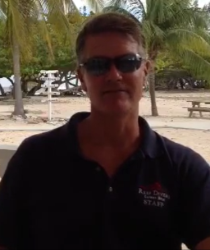
Watersports high school option, not a career choice
 (CNS Business Video): Reef Divers Cayman Brac has been working with the high school on the island since 2007 to provide a watersports vocational course as an introduction to the diving industry. Over the last seven years more than 30 students have been through the course but not one of them has chosen diving as a career. Talking to CNS Business in this week’s video interview, Dive Operations Manager Mick Maher says that diving offers a good living on the island and is a lot of fun, but young people just aren’t entering the industry. Reef Divers took over the high school programme on the Brac after the Divi Tiara closed down in 2006, and they teach courses through to Rescue Diver to students who choose it as an option in Years 11 and 12.
(CNS Business Video): Reef Divers Cayman Brac has been working with the high school on the island since 2007 to provide a watersports vocational course as an introduction to the diving industry. Over the last seven years more than 30 students have been through the course but not one of them has chosen diving as a career. Talking to CNS Business in this week’s video interview, Dive Operations Manager Mick Maher says that diving offers a good living on the island and is a lot of fun, but young people just aren’t entering the industry. Reef Divers took over the high school programme on the Brac after the Divi Tiara closed down in 2006, and they teach courses through to Rescue Diver to students who choose it as an option in Years 11 and 12.
The only working locally born divemaster on the island, BJ Walton (26), went through the programme at high school and then worked with the Divi dive operation to gain his divemasters certification.
Maher says the job is not just about safety and leading a dive but about entertaining, and for local divemasters it’s about representing your island.
Watch interview on CNS Business
The interview with Maher continues tomorrow.
Later this week, CNS Business talks to Cayman Islands Diving Hall of Fame member, Cornell Burke, a former dive manager with Brac Aquatics.

Rising stars shine in Wellington
 (CIEF): For twelve weeks at the beginning of every year, Wellington, Florida is host to WEF, the Winter Equestrian Festival, which draws in the who’s who of the international show jumping world. The 2014 season did not disappoint, but was so marked by the dominance of British show jumpers, that organizing CEO Mark Bellisimo joked that next year’s festival would be renamed the BEF – the ‘British’ Equestrian Festival. Two rising show jumping stars of Cayman were lucky enough to meet one of those British stars, Ben Maher, whilst catching the end of the festival. The youth riders were in Wellington to compete in the Second Annual FEI Group IV Caribbean Challenge.
(CIEF): For twelve weeks at the beginning of every year, Wellington, Florida is host to WEF, the Winter Equestrian Festival, which draws in the who’s who of the international show jumping world. The 2014 season did not disappoint, but was so marked by the dominance of British show jumpers, that organizing CEO Mark Bellisimo joked that next year’s festival would be renamed the BEF – the ‘British’ Equestrian Festival. Two rising show jumping stars of Cayman were lucky enough to meet one of those British stars, Ben Maher, whilst catching the end of the festival. The youth riders were in Wellington to compete in the Second Annual FEI Group IV Caribbean Challenge.
Polly Serpell and Thea Millward travelled to Wellington at the beginning of April to compete in a three day Challenge event against other young riders from the Caribbean. The Challenge was organized by a combination of WEF, the US Equestrian Federation and the FEI’s Group IV members and a number of Caribbean countries each sent two riders. The visiting riders borrowed horses from a pool lent by riders from North America who also attended and competed at the Challenge.
After a warm up competition, the first event to kick things off was the Group IV Classic. Thea Millward had a great round and was delighted to finish in 2nd place, highest placed in the Caribbean, with Polly Serpell finishing 11th. At the next event, the Group IV Championship Competition, Millward had an unlucky refusal and was eliminated but it was Serpell’s turn to excel and she finished fifth, the highest placed Caribbean rider on the second day. Serpell was also awarded ‘Best Horse’ for the horse she borrowed, Montego.
For Serpell, this is priceless show mileage in preparation for her attendance at the Youth Olympic Games in August 2014, where she will compete for Cayman against the best youth show jumpers in the world. Serpell has been competing consistently in Florida since she qualified for the Games last year.

Burst water pipe on Elgin Avenue
(CNS): The Water Authority says there is a broken water main on Elgin Avenue in George Town near the intersection of Goring Avenue and service to Customers on Goring Avenue to the GT Police Station has been interrupted. The WA operations crew is diligently working to identify the exact location of the leak and as soon as the leak is identified and damage assessed, repairs will begin, the authority says. Drivers are asked to take note of this emergency and avoid the area where possible. If the area cannot be avoided, the WA warns that traffic has been reduced to one lane on Elgin Ave and motorist are asked to proceed with caution and obey all road signs. The Water Authority apologizes for any inconvenience caused.
